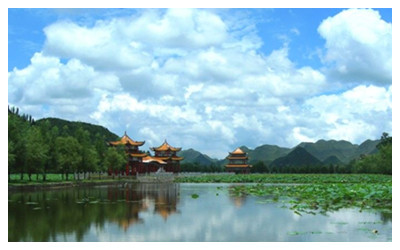
Zhaodi Dyke Scenic Area
 Zhaodi Dyke Scenic Area, located in northeastern Anlong County of Guizhou Province, is famous for its beautiful natural scenery and splendid historical culture. The scenic area is surrounded by hills on three sides with the county on the fourth side, and covers an area of approximately 5 square kilometers.
Zhaodi Dyke Scenic Area, located in northeastern Anlong County of Guizhou Province, is famous for its beautiful natural scenery and splendid historical culture. The scenic area is surrounded by hills on three sides with the county on the fourth side, and covers an area of approximately 5 square kilometers.
What to see?
The Zhaodi Dyke is lined by weeping willows on both sides. This dyke was originally built in 1694, in the Qing Dynasty. In successive eras, the dyke was added to in height by several meters. Originally, the dyke was built to protect the city wall, prevent flood and promote communications and was donated by Zhao Guolin, a military officer of the Qing Dynasty. It took over one year to build the dyke. Later, to commemorate his contributions, the dyke was named Zhaodi Dyke.
Around the dyke, there are numerous views. To the eastern end of the dyke stands a grand archway and to the south, a paddy field which directly leads to the county. A lake, the Green Sea, lies on the north of the dyke, covering an area of 600 mu (about 98 acres). The west of the dyke is connected to a hill. On the hill, pavilions built in different dynasties can be found here and there. Many stone carvings have been left here. In the year of 1848 of the Qing Dynasty, a pond was opened on the side of the dyke. Later, it became a lotus pond with Five Lotus-Enjoying Pavilions above it. These pavilions are linked together by a long bridge. The lotus gives off a fragrant smell when flowering.
In addition, in the vicinity of the dyke there are a number of historic sites. For example, the Eighteen Officials' Tombs built during the Ming Dynasty, the grave of Zhang Linxiang together with Ma Hetu (two leaders of an uprising of the Hui group in the Qing Dynasty) and the Imperial Drill Ground of the Ming Dynasty.
Travel Tips
Add: Anlong County, Qianxinan,Guizhou Province
Opening Hours: 08:00-18:00
Entrance Fee: CNY 50



 Ask Questions ?
Ask Questions ?